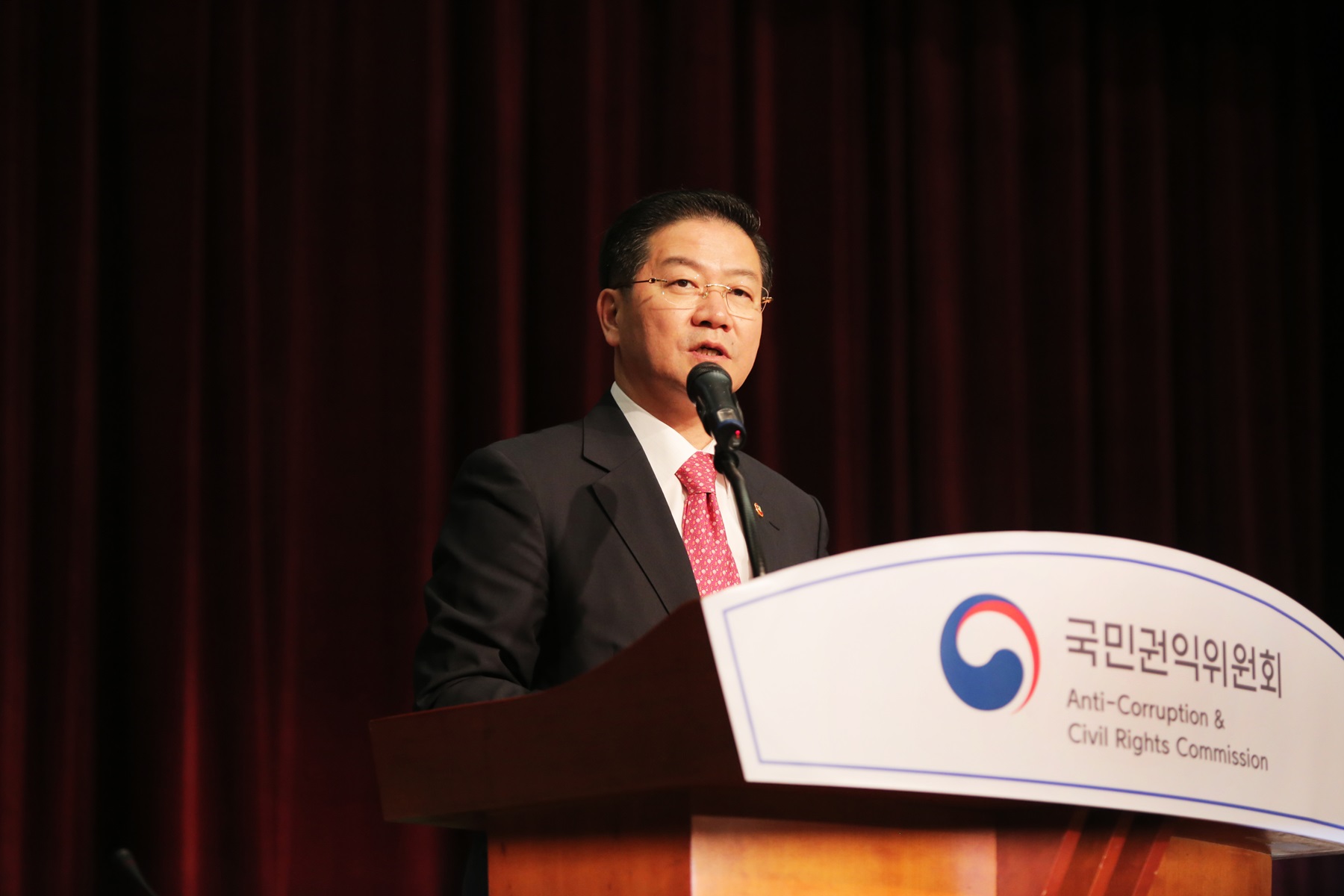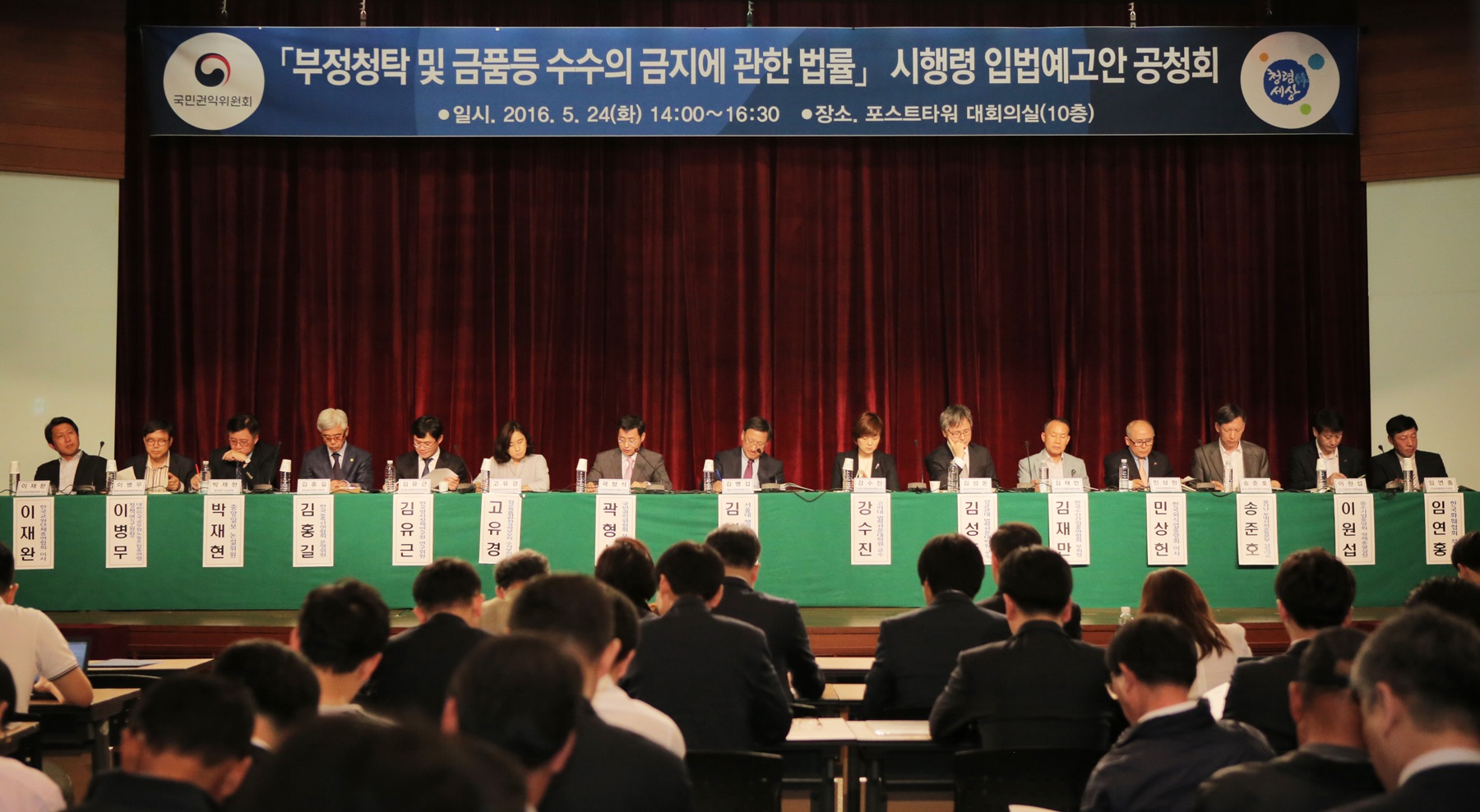ACRC announces draft Enforcement Decree of the Improper Solicitation and Graft Act
- Date2016-05-13
- Hit4,385
Specifying acceptable limits for food or gifts and process for reporting violations
The Commission will finalize the draft Enforcement Decree after listening to various opinions of society through public hearings and other means during the 40 days of pre-announcement period.
The main contents of the draft Enforcement Decree of the Improper Solicitation and Graft Act
a. Acceptable limits for food and drink or gifts offered for social relationships or rituals
Pursuant to the Act, a public official or relevant person who received any financial or other advantage in excess of one million won at a time or three million won in a fiscal year from the same person, regardless of the relationship between such offer and his or her duties, and the motive for such offer, shall be subject to criminal punishment. Also, fine for negligence will be imposed on a public official or relevant person if he or she received any financial or other advantage not exceeding one million won in connection with his or her duties. The general public who offered any financial or other advantage to a public official or relevant person will be equally subject to criminal punishment or fine for negligence.
The Act stipulates that the value of "food and drink, gifts, or other items that are offered to facilitate performance of duties or for social relationships, rituals, or assistance to festivities and funerals" shall be within the limit provided by Presidential Decree. (Article 8, paragraph 3, sub-paragraph 2 of the Act)
Various opinions about the acceptable value have been gathered up to date. For example, at an open forum held last May, opinions were raised that the increase in prices and other factors should be considered when determining the limit of acceptable value, and that the limit should be above the current limit (a ceiling of 30,000 won on food and 50,000 won on festivities and funerals, and prohibition of gifts from the general public in regard to public duties) under the Code of Conduct for Public Officials (Presidential Decree).
A survey of 1,500 general citizens conducted by the ACRC last July revealed that the majority of people believed that the appropriate limit was 30,000 won for food, 50,000 won for gifts, and 50,000 or 100,000 won for festivities and funerals.
In the meantime, agricultural, livestock, fisheries, and floral industries voiced their concerns over possible decrease in demand, asking that they should become exceptions to the Act. The restaurant and food service industry argued that the limit for food should increase.
On the other hand, on the grounds that the offer and acceptance of gifts or bribes can be facilitated, civil society organizations and parents' associations argued that the current limit under the Code of Conduct for Public Officials should be maintained or that the offer and acceptance of food or gifts should be prohibited without exception.
The acceptable limits were determined as 30,000 won for food, 50,000 won for gifts, and 100,000 won for festivities and funerals, considering the objective of the Act, people's perception shown by public surveys, and the Act's impact on society as a whole such as punishment for not only public officials who received pecuniary benefits but also the general public who offered them, as well as Korean culture where people support one another at festivities and funerals.
Also, to prevent confusion in enforcing the Act, the criteria under the Code of Conduct for Public Officials, which was enacted in 2003, will comply with those of the Enforcement Decree.
b. Restriction of acceptance of honoraria for outside lectures related to public duties
As for employees of media companies and private schools, the hourly limit is one million won regardless of their positions. However, if they give lectures related to public service while they participate in committees of public organizations, the amount of honoraria will not exceed one million won at a time. This is to uphold the private sector's independence and market economy principle where the level of one's expertise determines the amount of honorarium he or she gets.
c. Reporting and handling of violations and other matters
As for disciplinary measures toward public officials who accepted improper solicitation, the draft Enforcement Decree introduced designation of co-performer of the duty and change of duties other than provisional suspension of performing the duties and transfer which are stipulated in the Act.
Also, procedures and considerations were stipulated for a case where a head of the relevant agency discloses the details of an improper solicitation and the measures taken.
The draft Enforcement Decree stipulates other matters necessary for the enforcement of the Act such as the way of reporting a public official or relevant person who accepted improper solicitations, financial or other advantages; and the processes of the ACRC and other investigative agencies for handling such reports.
An official of the ACRC said, "We will spare no effort to successfully enact the Enforcement Decree and take follow-up measures such as promoting the Act and providing training to the public and public officials for the rest of the time."
"We expect that the Improper Solicitation and Graft Act can reduce the practices of making improper solicitations and giving and receiving financial advantages, thereby significantly enhancing the national integrity," the official added.
After gathering opinions of stakeholders, relevant ministries, and experts during the period of pre-announcement of the Enforcement Decree (May 13 to June 22) and going through government legislation procedures including the deliberation of the Ministry of Government Legislation, the ACRC plans to adopt the final version of the Enforcement Decree before the enforcement of the Improper Solicitation and Graft Act on September 28.
| The Anti-Corruption and Civil Rights Commission (ACRC) announced on Friday, May 13 the draft Enforcement Decree of the Improper Solicitation and Graft Act which stipulates detailed guidelines on the Act to be enforced on September 28, 2016. The ACRC drafted the Enforcement Decree by gathering opinions from various sectors in society through open forums, meetings of professional groups, consultation of experts, regional briefings, public surveys, and online policy discussion via the e-People (www.epeople.go.kr) system. |  |
The main contents of the draft Enforcement Decree of the Improper Solicitation and Graft Act
a. Acceptable limits for food and drink or gifts offered for social relationships or rituals
Pursuant to the Act, a public official or relevant person who received any financial or other advantage in excess of one million won at a time or three million won in a fiscal year from the same person, regardless of the relationship between such offer and his or her duties, and the motive for such offer, shall be subject to criminal punishment. Also, fine for negligence will be imposed on a public official or relevant person if he or she received any financial or other advantage not exceeding one million won in connection with his or her duties. The general public who offered any financial or other advantage to a public official or relevant person will be equally subject to criminal punishment or fine for negligence.
The Act stipulates that the value of "food and drink, gifts, or other items that are offered to facilitate performance of duties or for social relationships, rituals, or assistance to festivities and funerals" shall be within the limit provided by Presidential Decree. (Article 8, paragraph 3, sub-paragraph 2 of the Act)
Various opinions about the acceptable value have been gathered up to date. For example, at an open forum held last May, opinions were raised that the increase in prices and other factors should be considered when determining the limit of acceptable value, and that the limit should be above the current limit (a ceiling of 30,000 won on food and 50,000 won on festivities and funerals, and prohibition of gifts from the general public in regard to public duties) under the Code of Conduct for Public Officials (Presidential Decree).
A survey of 1,500 general citizens conducted by the ACRC last July revealed that the majority of people believed that the appropriate limit was 30,000 won for food, 50,000 won for gifts, and 50,000 or 100,000 won for festivities and funerals.
In the meantime, agricultural, livestock, fisheries, and floral industries voiced their concerns over possible decrease in demand, asking that they should become exceptions to the Act. The restaurant and food service industry argued that the limit for food should increase.
On the other hand, on the grounds that the offer and acceptance of gifts or bribes can be facilitated, civil society organizations and parents' associations argued that the current limit under the Code of Conduct for Public Officials should be maintained or that the offer and acceptance of food or gifts should be prohibited without exception.
The acceptable limits were determined as 30,000 won for food, 50,000 won for gifts, and 100,000 won for festivities and funerals, considering the objective of the Act, people's perception shown by public surveys, and the Act's impact on society as a whole such as punishment for not only public officials who received pecuniary benefits but also the general public who offered them, as well as Korean culture where people support one another at festivities and funerals.
Also, to prevent confusion in enforcing the Act, the criteria under the Code of Conduct for Public Officials, which was enacted in 2003, will comply with those of the Enforcement Decree.
b. Restriction of acceptance of honoraria for outside lectures related to public duties
| The Act prohibits a public official or relevant person from accepting money in excess of the limits provided under Presidential Decree as an honorarium for a lecture related to his or her duties or requested due to de facto influence arising from his or her position or responsibilities. (Article 10, paragraph 1 of the Act) For public officials and employees of public service-related organizations, the draft Enforcement Decree places hourly limits on honoraria for outside lectures based on the Code of Conduct for Public Officials (500,000 won per hour for Minister or above, 400,000 won for vice-minister, 300,000 won for senior deputy director or above, and 200,000 won for deputy director or below). If such a lecture exceeds one hour, additional compensation will be limited to half of the hourly limit. |  |
c. Reporting and handling of violations and other matters
As for disciplinary measures toward public officials who accepted improper solicitation, the draft Enforcement Decree introduced designation of co-performer of the duty and change of duties other than provisional suspension of performing the duties and transfer which are stipulated in the Act.
Also, procedures and considerations were stipulated for a case where a head of the relevant agency discloses the details of an improper solicitation and the measures taken.
The draft Enforcement Decree stipulates other matters necessary for the enforcement of the Act such as the way of reporting a public official or relevant person who accepted improper solicitations, financial or other advantages; and the processes of the ACRC and other investigative agencies for handling such reports.
An official of the ACRC said, "We will spare no effort to successfully enact the Enforcement Decree and take follow-up measures such as promoting the Act and providing training to the public and public officials for the rest of the time."
"We expect that the Improper Solicitation and Graft Act can reduce the practices of making improper solicitations and giving and receiving financial advantages, thereby significantly enhancing the national integrity," the official added.
After gathering opinions of stakeholders, relevant ministries, and experts during the period of pre-announcement of the Enforcement Decree (May 13 to June 22) and going through government legislation procedures including the deliberation of the Ministry of Government Legislation, the ACRC plans to adopt the final version of the Enforcement Decree before the enforcement of the Improper Solicitation and Graft Act on September 28.









